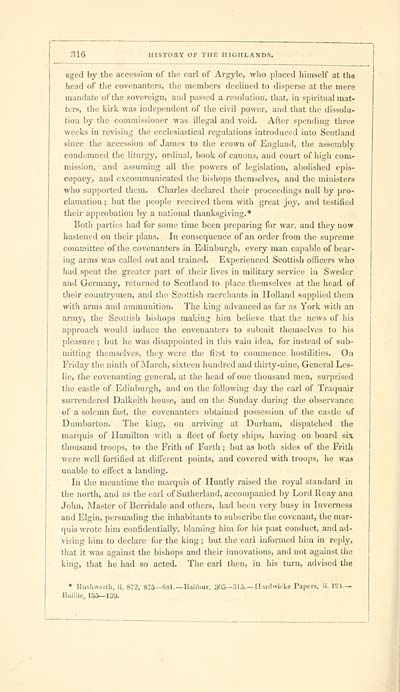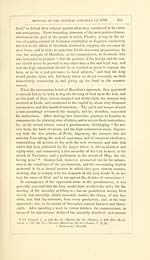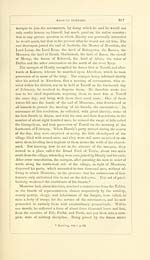Download files
Complete book:
Individual page:
Thumbnail gallery: Grid view | List view

316 HISTORY Of THE HIGHLANDS.
ttged by the accession of the earl of Argyle, who placed himself at tha
head of the covenanters, the members declined to disperse at the mere
mandate of the sovereign, and passed a resolution, that, in spiritual mat-
ters, the kirk was independent of the civil power, and that the dissolu-
tion by the commissioner was illegal and void. After spending three
weeks in revising the ecclesiastical regulations introduced into Scotland
since the accession of James to the crown of England, the assembly
condemned the liturgy, ordinal, book of canons, and court of high com-
mission, and assuming all the powers of legislation, abolished epis-
copacy, and excommunicated the bishops themselves, and the ministers
who supported them. Cliarles declared their proceedings null by pro-
clamation ; but the people received them with great joy, and testified
their approbation by a national thanksgiving.*
Both parties had for some time been preparing for war, and they now
hastened on their plans. In consequence of an order from the supreme
committee of the covenanters in Edinburgh, every man capable of bear-
ing arms was called out and trained. Experienced Scottish officers who
had spent the greater part of their lives in military service in Swedor
and Germany, returned to Scotland to place themselves at the head of
their countrymen, and the Scottish merchants in Holland supplied them
with arms and ammunition. The king advanced as far as York with an
army, the Scottish bishops making him believe that the news of his
approach would induce the covenanters to submit themselves to his
pleasure ; but he was disappointed in this vain idea, for instead of sub-
mitting themselves, they were the first to commence hostilities. On
Friday the ninth of March, sixteen hundred and thirty-nine, General Les-
lie, the covenanting general, at the head of one thousand men, surprised
the castle of Edinburgh, and on the following day the earl of Traquair
surrendered Dalkeith house, and on the Sunday during the observance
of a solemn fast, the covenanters obtained possession of the castle of
Dumbarton. The king, on arriving at Durham, dispatched the
marquis of Hamilton ^^■ith a fleet of forty ships, having on board six
thousand troops, to the Frith of Forth ; but as botli sides of the Frith
were well fortified at different points, and covered with troops, he was
unable to effect a landing.
In the meantime the marquis of Huntly raised the royal standai'd in
the north, and as the earl of Sutherland, accompanied by Lord lleay ana
John, Master of Berridale and others, had been very busy in Inverness
and Elgin, persuading the inhabitants to subscribe the covenant, the mar-
quis wrote him confidentially, blaming him for his past conduct, and ad-
vising him to declare for the king ; but the earl informed him in reply,
that it was against the bishops and their innovations, and not against the
king, that he had so acted. The earl then, in his turn, advised the
• Rushwoith, ii. 872, 875— SSI.— BaUour, 303— 313. — M^inUvkke Papers, ii. Kl —
Buillie, 135—139.
ttged by the accession of the earl of Argyle, who placed himself at tha
head of the covenanters, the members declined to disperse at the mere
mandate of the sovereign, and passed a resolution, that, in spiritual mat-
ters, the kirk was independent of the civil power, and that the dissolu-
tion by the commissioner was illegal and void. After spending three
weeks in revising the ecclesiastical regulations introduced into Scotland
since the accession of James to the crown of England, the assembly
condemned the liturgy, ordinal, book of canons, and court of high com-
mission, and assuming all the powers of legislation, abolished epis-
copacy, and excommunicated the bishops themselves, and the ministers
who supported them. Cliarles declared their proceedings null by pro-
clamation ; but the people received them with great joy, and testified
their approbation by a national thanksgiving.*
Both parties had for some time been preparing for war, and they now
hastened on their plans. In consequence of an order from the supreme
committee of the covenanters in Edinburgh, every man capable of bear-
ing arms was called out and trained. Experienced Scottish officers who
had spent the greater part of their lives in military service in Swedor
and Germany, returned to Scotland to place themselves at the head of
their countrymen, and the Scottish merchants in Holland supplied them
with arms and ammunition. The king advanced as far as York with an
army, the Scottish bishops making him believe that the news of his
approach would induce the covenanters to submit themselves to his
pleasure ; but he was disappointed in this vain idea, for instead of sub-
mitting themselves, they were the first to commence hostilities. On
Friday the ninth of March, sixteen hundred and thirty-nine, General Les-
lie, the covenanting general, at the head of one thousand men, surprised
the castle of Edinburgh, and on the following day the earl of Traquair
surrendered Dalkeith house, and on the Sunday during the observance
of a solemn fast, the covenanters obtained possession of the castle of
Dumbarton. The king, on arriving at Durham, dispatched the
marquis of Hamilton ^^■ith a fleet of forty ships, having on board six
thousand troops, to the Frith of Forth ; but as botli sides of the Frith
were well fortified at different points, and covered with troops, he was
unable to effect a landing.
In the meantime the marquis of Huntly raised the royal standai'd in
the north, and as the earl of Sutherland, accompanied by Lord lleay ana
John, Master of Berridale and others, had been very busy in Inverness
and Elgin, persuading the inhabitants to subscribe the covenant, the mar-
quis wrote him confidentially, blaming him for his past conduct, and ad-
vising him to declare for the king ; but the earl informed him in reply,
that it was against the bishops and their innovations, and not against the
king, that he had so acted. The earl then, in his turn, advised the
• Rushwoith, ii. 872, 875— SSI.— BaUour, 303— 313. — M^inUvkke Papers, ii. Kl —
Buillie, 135—139.
Set display mode to: Large image | Transcription
Images and transcriptions on this page, including medium image downloads, may be used under the Creative Commons Attribution 4.0 International Licence unless otherwise stated. ![]()
| Early Gaelic Book Collections > Ossian Collection > History of the Highlands and of the Highland clans > Volume 1 > (430) |
|---|
| Permanent URL | https://digital.nls.uk/79677757 |
|---|
| Description | Vol. I. |
|---|---|
| Shelfmark | Oss.247 |
| Additional NLS resources: | |
| Attribution and copyright: |
|
| Description | Selected books from the Ossian Collection of 327 volumes, originally assembled by J. Norman Methven of Perth. Different editions and translations of James MacPherson's epic poem 'Ossian', some with a map of the 'Kingdom of Connor'. Also secondary material relating to Ossianic poetry and the Ossian controversy. |
|---|
| Description | Selected items from five 'Special and Named Printed Collections'. Includes books in Gaelic and other Celtic languages, works about the Gaels, their languages, literature, culture and history. |
|---|

